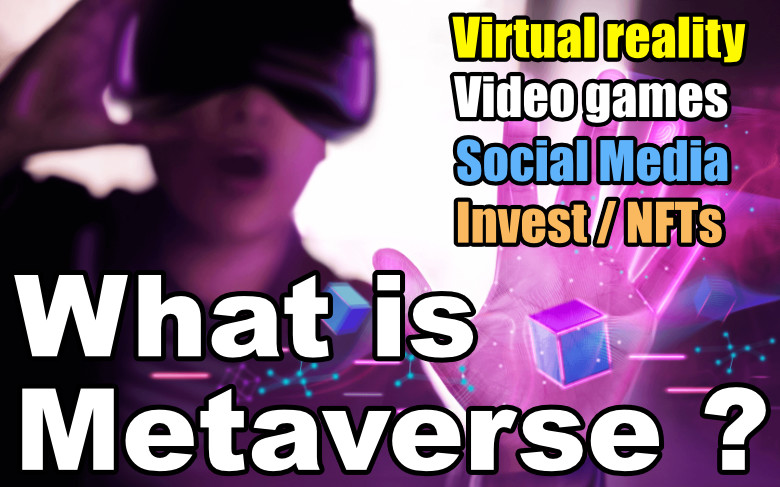Metaverse
The metaverse (a portmanteau of “meta-” and “universe”) is a hypothesized iteration of the internet, supporting persistent online 3-D virtual environments through conventional personal computing, as well as virtual and augmented reality headsets. Metaverses, in some limited form, are already present on platforms like VR Chat or video games like Second Life.
Current metaverse ambitions are centered on addressing technological limitations with modern virtual and augmented reality devices, as well as expanding the use of metaverse spaces to business, education, and retail applications. Numerous entertainment and social media companies have invested in metaverse-related research and development.
The metaverse has come to be criticised as a method of public relations building using a purely speculative, “over-hyped” concept based on existing technology. Information privacy and user addiction are concerns within the metaverse, stemming from current challenges facing the social media and video game industries as a whole.
The metaverse is a hypothesized iteration of the internet, supporting persistent online 3-D virtual environments through conventional personal computing, as well as virtual and augmented reality headsets. Metaverses, in some limited form, are already present on platforms like VRChat or video games like Second Life
01. What are some examples of it?
Here’s a look at what’s happening today that could lead to the metaverse of tomorrow:
♦ Meta
The tech giant formerly known as Facebook has already made significant investments in virtual reality, including the 2014 acquisition of Oculus. Meta envisions a virtual world where digital avatars connect through work, travel or entertainment using VR headsets. Zuckerberg has been bullish on the metaverse, believing it could replace the internet as we know it. “The next platform and medium will be even more immersive and embodied internet where you’re in the experience, not just looking at it, and we call this the metaverse,” said Meta CEO Mark Zuckerberg last month after revealing the company’s rebranding.
♦ Epic Games
Tim Sweeney, CEO of the company that developed Fortnite, has said, “It’s no secret that Epic is invested in building the metaverse.” It’s held concerts by the likes of Ariana Grande and Travis Scott, movie trailers and music debuts and even an “immersive” re-imagining of Martin Luther King Jr.’s 1963 historic “I Have A Dream” speech. And it’s developing photorealistic digital humans with its MetaHuman Creator, which could be how you customize your digital doppelganger in future open-world games.
♦ Real gear in a virtual world
Fortnite partners with Balenciaga on outfits for you and your avatar.
02. WHAT WILL I BE ABLE TO DO IN THE METAVERSE ?
It’s a concept that involves an online world where people can interact with others, collaborate and communicate virtually, without needing to be in the same space. For example, you can be in New Delhi and your family may be in Kolkata, but you could enjoy a dinner together sitting around the same table. It’s like Zoom or Google Meet on steroids. Instead of staring at a screen, you’d be actually seeing your family members across the table.
The potential of virtual reality is immense, especially from a business point of view. How about being able to do a full try-out of the dress you’ve found online before placing an order. Or, actually hopping into the car you want to take for a test ride sitting in your drawing room?
The metaverse also could be a game-changer for the work-from-home shift amid the coronavirus pandemic. Instead of seeing co-workers on a video call grid, employees could join them in a virtual office.
03. HOW WILL IT WORK?
Facebook made its first forays into creating a VR world with the launch in 2019 of Facebook Horizon, an invitation-only immersive environment that users can enter by putting on an Oculus headset. In August, it rolled out Horizon Workrooms, a feature where co-workers wearing VR headsets can hold meetings in a virtual room where they all appear as cartoonish 3D versions of themselves.
However, going forward, the outlook is for the metaverse to be a much more evolved space. As venture capitalist Matthew Ball wrote in a blog post, the metaverse will be “a fully functioning economy… where individuals and businesses will be able to create, own, invest, sell” products. There are already gaming tokens that are monetisable and a new class of assets called NFTs (non-fungible tokens) has also emerged that only exist digitally.
04. WHY IS IT TAKING OFF ?
Fans of the metaverse see it as the next stage in the development of the internet.
At the moment, people interact with each other online by going to websites such as social media platforms or using messaging applications. The idea of the metaverse is that it will create new online spaces in which people’s interactions can be more multi-dimensional, where users are able to immerse themselves in digital content rather than simply viewing it.
The accelerated interest in the metaverse can be seen as a result of the COVID-19 pandemic. As more people have started working and going to school remotely, there has been increased demand for ways to make online interaction more lifelike.
05. Current implementations
♦ Video games
Several components of metaverse technologies have already been developed within modern internet-enabled video games. The 2003 video game Second Life is often described as the first metaverse, as it incorporated many aspects of social media into a persistent virtual world. Social functions are often an integral feature in many massively multiplayer online games. Technology journalist Clive Thompson has argued that the emergent, social-based gameplay of Minecraft represents an advanced implementation of the metaverse.Other claims of developing a metaverse have been made for the games Active Worlds, Roblox, Decentraland, and Fortnite in addition to a few early MUD games.
♦Virtual reality
Metaverse development has often focused on bettering virtual reality technologies due to benefits in establishing immersion in virtual environments. In 2019, the social network company Facebook launched a social VR world called Facebook Horizon. Facebook would later be renamed “Meta Platforms” in 2021. Its chairman Mark Zuckerberg declared a company commitment to developing a metaverse ecosystem. Much of the underlying virtual reality technology that Meta Platforms advertised remains to be developed.Microsoft acquired the VR company AltspaceVR in 2017, and is planning on integrating metaverse features into Microsoft Teams. Nike also foresees the Metaverse and begins to construct ‘Nikeland’ in 2021 on Roblox, an online video game based virtual environment
Everyone wants to own the metaverse including Facebook and Microsoft. But what exactly is it?
When can we expect to see it?
Mark Zuckerberg, the CEO of the newly named Meta (formerly Facebook), estimates it could take five to 10 years before the key features of the metaverse become mainstream. But aspects of the metaverse currently exist. Ultra-fast broadband speeds, virtual reality headsets and persistent always-on online worlds are already up and running, even though they may not be accessible to all.
What are some examples of it?
♦ Meta. The tech giant formerly known as Facebook has already made significant investments in virtual reality, including the 2014 acquisition of Oculus. Meta envisions a virtual world where digital avatars connect through work, travel or entertainment using VR headsets. Zuckerberg has been bullish on the metaverse, believing it could replace the internet as we know it. “The next platform and medium will be even more immersive and embodied internet where you’re in the experience, not just looking at it, and we call this the metaverse,” said Meta CEO Mark Zuckerberg last month after revealing the company’s rebranding.
♦ Microsoft. The software giant already uses holograms and is developing mixed and extended reality (XR) applications with its Microsoft Mesh platform, which combine the real world with augmented reality and virtual reality. Earlier this month, Microsoft showed off its plans for bringing mixed-reality including holograms and virtual avatars to Microsoft Teams in 2022. Also in the works for next year: explorable 3D virtual connected spaces for retail and workplaces. The U.S. Army is currently working with Microsoft on an augmented reality Hololens 2 headset for soldiers to train, rehearse and fight in. Beyond that, Xbox Live already connects millions of video game players across the globe, too
♦ Epic Games. Tim Sweeney, CEO of the company that developed Fortnite, has said, “It’s no secret that Epic is invested in building the metaverse.” It’s held concerts by the likes of Ariana Grande and Travis Scott, movie trailers and music debuts and even an “immersive” re-imagining of Martin Luther King Jr.’s 1963 historic “I Have A Dream” speech. And it’s developing photorealistic digital humans with its MetaHuman Creator, which could be how you customize your digital doppelganger in future open-world games.
►Real gear in a virtual world:Fortnite partners with Balenciaga on outfits for you and your avatar
►From NFL to Air Jordan to Ariana Grande:The biggest Fortnite crossover events so far
♦ Roblox. The platform, founded in 2004, houses scores of user-generated games, including role-playing offerings like Bloxburg and Brookhaven, where users can build homes, work and play out scenarios. Roblox is now valued at more than $45 billion after going public this year. the On the day of its IPO in March, Roblox founder and CEO David Baszucki tweeted a thank you to all who helped bring the platform “one step closer to fulfilling our vision of the #Metaverse.” Since then, Roblox has teamed up with skateboarding shoe company Vans to create Vans World, a virtual skateboarding park where players can dress up in fresh Vans gear and opened a limited Gucci Garden, where you can try and buy clothing and accessories for your virtual self.
♦ Minecraft. Another virtual universe beloved by kids, the Microsoft-owned Minecraft is essentially the digital equivalent of Legos, where players can create their own digital character and build whatever they desire. As of August, Minecraft boasts more than 140 million monthly active users. During the pandemic, it has exploded in popularity among kids who had to rely more heavily on virtual connections.
Some lesser-known companies have launched their own online worlds. The online fantasy world Second Life, founded in 2003, is in its second decade as an alternate reality.
The online haven Nowhere has persistent and temporary virtual spaces – for public or private use – to hold concerts, festivals, reunions, and conferences. The Windmill Factory, the New York production company which began developing the platform more than a year ago, has done projects for Lady Gaga and Nine Inch Nails.
The Sensorium Galaxy earlier this year opened the first two of its planned galaxy of various connected online “worlds” to explore with VR headsets or desktop computers. Prism, the first to open, involves music – virtual DJs and bands play, for instance – in futuristic landscapes.



